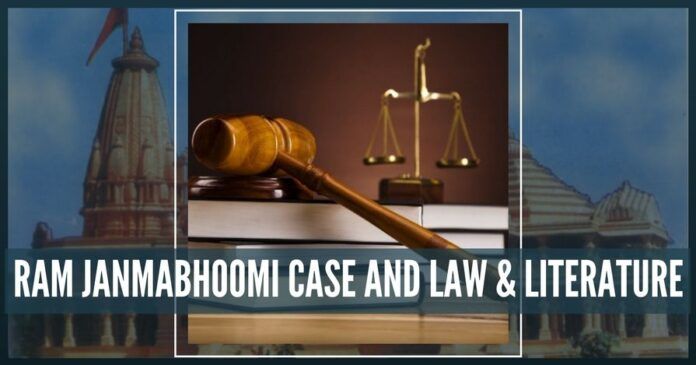
We hope that pearls and wisdom as mentioned in Indian literature finds a place in Indian law
Valimiki in his wildest dreams would not have thought that Sri Rama’s birthplace would be a subject matter of dispute in this holy land to be decided by Supreme Court of India. While judicial observation is that its nothing more than land dispute, the character on the basis of whom entire India and this case is constructed and based upon – Sri Rama – viewed as divine incarnation as well as “atmanam manusham manye”. ie., according to himself his conduct was that of the human being desirous of acting comfortably to the highest ideals of Dharma or the best traditions of his time.
The most celebrated of Shakespeare’s legal plays, “The Merchant of Venice” is often quoted by jurists as a reference point
As part of submissions to the supreme court in Ramjhanmaboomi case, Valmiki Ramayana, Bhagawad Gita, Ramcharitmanas has been submitted. While the submitted texts contain highest transcendental truth expressed in the form of formulae’s/stories which may not be the subject to interpretation, this brings to focus an important point of Indian literature being part of the law. Law and literature are related to each other in interesting ways. Innumerable literary works, take law for a theme and feature trial, (The Merchant of Venice, The Trial), conflicting jurisprudential theories (King Lear), crime and punishment (Oliver twist, paradise lost). These examples could be multiplied manyfold.
Literature in Law :
Two justices of the US supreme court – Justice Scalia and Breyer once dueled in a case over the meaning of Robert Frost’s poem “the mending walls”. To Justice Scalia’s statement that “Separation of powers, a distinctively American political doctrine, profits from the advice authored by a distinctively American poet: Good fences make good neighbours.” Justice Breyer replied:”One might consider as well that poet’s caution, for he not only notes that ‘Something there is that doesn’t love a wall,’ but also writes, ‘Before I built a wall I’d ask to know / What I was walling in or walling out.”‘
In 2011, while deciding on the matter of mercy killing, Justice Markandey Katju started his judgment by quoting Mirza Ghalib , “Marte hain aarzoo mein marne ki, Maut aati hai par nahin aati (One dies longing for death/but death, despite being around, is elusive)”. Justice Katju’s blog and his love for a pound of flesh is well known !
No author of imaginative literature has seemed to have to have more to say about law that Kafka, himself a lawyer, whose great novel The Trial opens with the arrest of the protagonist, Joseph K., and ends with K.s execution one year later, and whose short stories and fragments frequently take law for their theme. Kafka has been cited more than 400 times in American Judicial opinions though it would be a mistake to attribute the number of unsuspected literary sensibilities on the part of judges or their law clerks.
Law in literature : Two Anecdotes
Milton’s Paradise Lost : Life on earth, for most people and animals, is full of suffering. This sad truth is presented in the poem, as in orthodox Christian theology, as the punishment for Adam’s eating the forbidden fruit in the Garden of Eden. Paradise lost is being viewed as God’s legal penal dictum because there are no human laws in the poem but plenty of punishment condoned by almighty – punishment of fallen angels, exiled to hell; of Adam and Eve, expelled from the Garden of Eden and condemned to mortality along with their descendants; of the son, who is going to be executed by the Romans during his incarnation as a human being etc.,
It is the story of very spring of Indian civilisation and culture and is now being cherished worldwide
The most celebrated of Shakespeare’s legal plays, “The Merchant of Venice” is often quoted by jurists as a reference point. If we have to analyse it carefully, the legal aspects are on one level absurd. ie., penalty clause – that is, a contract provision that specifies a number of damages to be awarded in the event of a breach of the contract that exceeds a reasonable estimate of the loss likely to be caused by the breach – is unenforceable. Nevertheless, Shakespeare cannot be criticised for creating the dramatic and rhetoric effect.
Universal appeal of Indian Epic – Ramayana
Ramayana is a story spread so wide amongst the people known even to children. It is the story of very spring of Indian civilisation and culture and is now being cherished worldwide. While there are no parallels to this story this epic contains a reference to important character – Akalya, ruined a great life besides her own, viz., Gautama. After ages, during which they remained separate, Gautama returns find Ahalya who through the touch of Rama and Lakshmana, becomes purified takes her back to his bosom. That was the noble life of our ancients when it was still simple and unsophisticated and uncorrupted. Sin there is. Who does not sin? No one who is not liable to err. To err is human; to forgive is divine. Forgiveness is among greatest virtues of our character.
Drawing parallels to Valmiki Ramayana’s Akalya is Guinevere, an epic character part of Tennyson’s poem, King Arthur of the Round Table. King Arthur stood for personal honour, personal valour, widespread benevolence, universal love, readiness to succour distress. His whole work was ruined by the misconduct of his wife – Guinevere, another famous beauty of fiction, one who erred with Lancelot. King Arthur knowing that his end was near going to meet her for a final interview at the nunnery. The final scene words are Tennyson at this very best and can be found here :
So the end of these stories are eternal lessons for us: true repentance followed by a pure life must lead to forgiveness. Forgiveness though practised by a human mind is divine in its quality. Eastern mysticism said this concept much before birth cycle of Kali after which Tennyson picked up.
Will Indian Literature be part of Indian jurisprudence?
So far, Indian judicial autobiographies and judgements have liberally quoted Willam Shakespeare, John Keats, Milton and other proverbial English literature cum legal fiction minds. Indigenous Literary Giants like Kalidasa, Bhavabuti, Bhatruhari, Chanakya, Manu is yet to grace Indian jurisprudence with their brilliant piercing logic and legal treatise. We hope that pearls and wisdom as mentioned in Indian literature finds a place in Indian law as they contain timeless wisdom applicable to all walks of life covering all subjects of the earth much before Europeans learnt the necessity and codification of law. The above article is an attempt to bring out a discussion on this subject.
Note:
1. Text in Blue points to additional data on the topic.
2. The views expressed here are those of the author and do not necessarily represent or reflect the views of PGurus.
- Textbook revision – Submission from concerned citizen - August 14, 2023
- Abolishing Personal Income tax in India – A study along with History and Data - April 27, 2020
- A tete-a-tete between Guru Extraordinaire Paul Samuelson and his Genius Pupil, Dr. Swamy - September 4, 2019











A few more specific examples of jurisprudence in Indian literature would have been very useful. There are umpteen in the Mahabharata and Puranas. And there are as many in the later literatures some of which have been mentioned.
It is understood that Tamil Lit (TL) is vast, mature and very ancient. As cases developed TL should have found its place in Law and Jurisprudence. What is the current position in India?
Nice article trying to make point wrto Indian judges using Indian authors as mentioned in the article to quote wisdom and logic, this requires subtle intelligence deep appreciation and ability to understand and also to become one with these historical events to obtain wisdom to apply them for judging cases.
It in indeed a very pertinent and precious point of view which must be adopted, adapted and appreciated by the Indian Judiciary in order to penetrate and promulgate the most profound and paramount prudence of Justice and “Dharma” (since I find no appropriate word in English for it) in the interest of the Nation as well as the Human kind at large.
We must not ignore and ignominy the Inheritance of Inspiring Intellectuals of India any more and we must proud of such treasure of knowledge and virtue.